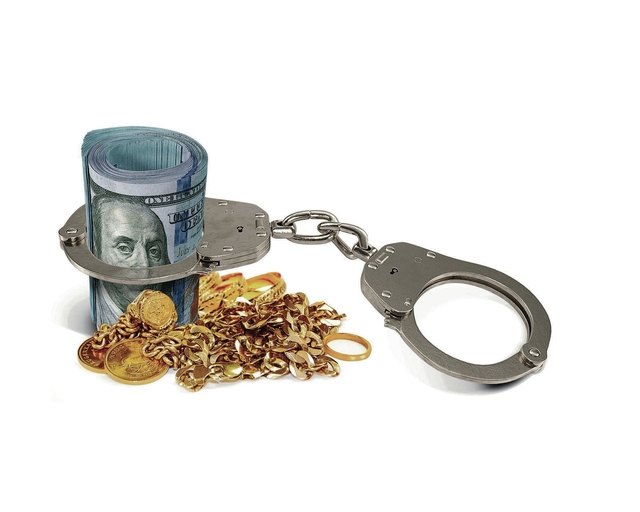When an SUV was broken into at Makapuu Lighthouse, Darrell Teixeira had a rock solid alibi — he was in prison.
But that didn’t stop the police from coming to his house in Waimanalo on the day of the crime and seizing his 2000 Honda Accord, which the state later auctioned off to the highest bidder at the Neal S. Blaisdell Center.
The police suspected that an ex-boyfriend of Teixeira’s daughter may have taken the Honda to Makapuu and broken into the SUV, stealing a handbag, silver cross, swimming goggles and clothes, according to police records. Then he drove the Honda back to Waimanalo, police said.
It didn’t matter that neither Teixeira nor his daughter was implicated in the robbery. Nor did it matter that the police hadn’t charged the ex-boyfriend with the crime.
Under Hawaii’s civil asset forfeiture program, law enforcement agencies can seize property suspected of being connected with criminal activity, even if they don’t obtain a conviction or file a criminal charge.
Property owners have two options. Within 30 days of receiving a notice of forfeiture, they can file a petition with the attorney general’s office making their case for why they should get back their property. They aren’t allowed to actually challenge the legality of the seizure, however, and defense attorneys describe this option as essentially throwing oneself on the mercy of the attorney general.
If this fails, owners can challenge the seizure in court.
But in Teixeira’s case, as well as the great majority of cases in which money and property are seized under Hawaii laws, the cost of challenging the seizure in court outweighs the value of what was confiscated, a Star-Advertiser review of hundreds of cases in recent years found.
Defense attorney Victor Bakke, who also used to work in the Honolulu prosecutor’s office, said that’s on purpose.
“What they do is they kind of have an amount that they figure out that most people won’t fight because it is not worth it. Would you spend $5,000 to get $3,000 back? Probably not. So it’s easy pickings for them,” he said.
The Honolulu Police Department and Honolulu Prosecutor Keith Kaneshiro declined comment or didn’t respond to interview requests for this story.
The ‘buy-in’ is high
To challenge a seizure in court, a property owner has to pay an upfront bond of $2,500 or 10 percent of the value of their property, whichever is greater. If they lose, they have to pay the state’s costs and expenses, including attorney’s fees, according to the attorney general’s office.
Since these are civil cases, claimants aren’t afforded a public defender if they don’t have money to hire an attorney. Bakke estimated that attorney’s fees in these cases could average $10,000.
During the 2014 and 2015 fiscal years, 80 percent of seizures involved money or property valued at $10,000 or less, according to data compiled by the Star-Advertiser based on documents provided by the attorney general’s office in response to a public records request.
Out of those 250 seizures, the average value was $2,648. The lowest amount seized was $91 in cash.
Half of all seizures during the 2014 and 2015 fiscal years involved cash or property valued at $2,500 or less.
Eapen Thampy, executive director for Americans for Forfeiture Reform, said that the data indicate that the police in most cases are going after relatively low-level offenders.
“It’s easiest and most profitable to target poor and minority populations,” he said.
But going after low-level drug offenders, or in the Teixeira case, someone who wasn’t even involved in the crime, flies in the face of the original purpose of civil asset forfeiture laws, said Thampy.
“These laws were sold as a way to get large drug organizations and drug kingpins,” he said, noting that most of the programs, like Hawaii’s, were implemented during the war on drugs in the 1980s. “But in reality, you see civil forfeiture used for really petty amounts — $2,000 or $3,000. People running around with that kind of money are not drug kingpins.”
The state has also used the program to go after alleged gambling operations.
Groups such as the American Civil Liberties Union and Institute for Justice, a libertarian law firm, have described civil asset forfeiture programs as the legalized theft of private property. Not only does it create ample opportunity for abuse, they say, but it violates a citizen’s right to due process.
Instead of innocent until proven guilty, people, or in these cases, their property, are guilty until proven innocent.
In successful administrative cases, the attorney general technically pardons the property.
The programs also come with what critics say is a perverse incentive: the attorney general’s office and law enforcement agencies, usually county police departments, get to keep the seized cash and proceeds from the property auctions. Sometimes they will keep vehicles for their departmental use.
“It just reeks of improprieties,” said Bakke.
During the 2014 and 2015 fiscal years, law enforcement agencies brought in about $2.2 million in cash, cars, electronics and other property, according to attorney general reports.
Josh Wisch, a spokesman for the attorney general’s office, said that his office wasn’t the right agency to comment on the program’s merits because it only administers the program.
But he said by email that Hawaii’s civil asset forfeiture program “is designed to ensure that due process is available to all those impacted by it.”
He noted that there are no costs involved in the administrative appeal. “The program is designed to allow anyone to file a claim or a petition for remission or mitigation to get any subject property back,” he said.
Mike Vincent, who oversees the asset forfeiture program for the attorney general’s office, said that his office tries to be very careful in reviewing cases. “If it looks even close that you are an innocent owner, we give it back,” he said.
Broad powers
All states have civil asset forfeiture programs, in addition to the federal government’s program, which splits revenues with states. Amid growing controversy over publicized abuses within the programs, some states have enacted reforms in recent years.
However, Hawaii’s program has remained one of the worst in the country, according to the Institute of Justice, which gave Hawaii a D-minus. The rating was based, in part, on the low standard of proof needed to seize property and the difficulty involved in retrieving the property if the owner is innocent.
Hawaii’s laws are also very broad. A review of several hundred cases in recent years indicates that most seizures are drug related. But not all.
For instance, in 2014 law enforcement seized the boat of a Molokai man who got in a fight with Oahu spear fishermen off Molokai.
Police also seized the Harley-Davidson motorcycle of Hawaii island resident Paul Gibson, who had gotten into a knife fight with another biker, then rode off.
“The police said he used it as a getaway vehicle,” said his attorney, Michael Zola.
Gibson missed the 30-day window to petition the attorney general to retrieve his bike. He assumed that the forfeiture notice had been sent to Zola, his attorney in the criminal case, but it hadn’t.
Zola said he asked the attorney general’s office for an extension, but that it was denied. And without an attorney general ruling, he couldn’t appeal the case to the court. Even if he had, he said it would have cost his client more than his $5,000 bike.
Defense attorneys say that a lot of the time the people are guilty of a crime. Gibson is currently serving a five-year sentence for stabbing the other biker.
But they question the propriety of confiscating property before there has ever been a conviction and say it just looks like people are being punished twice.
Furthermore, because the Hawaii laws are so broad, even if an owner did move forward with a court challenge, it can be difficult to win.
“It has to be clean,” said Bakke. “Most of this isn’t clean. … So the guy on the motorcycle — did he ride away on the motorcycle? Yes, he did.”
Laws ‘protect the community’
There have been recent attempts to reform Hawaii’s civil asset forfeiture program. For instance, lawmakers proposed a measure this past legislative session that would forbid property from being forfeited unless there is a conviction.
County police departments and prosecutor’s offices fought it, however, arguing that the civil asset forfeiture laws were instrumental in helping disrupt criminal activity by, in part, making crime unprofitable.
“Current forfeiture laws are used to immediately and effectively disrupt the infrastructure of criminal activity and protect the community,” wrote Kaneshiro in testimony opposing the measure. “In particular, the manufacturing, packaging, distribution and sale of illegal drugs can be immediately thwarted by seizing the materials, tools, equipment, cash, vehicles, etc., of these enterprises.”
He also said that Hawaii hadn’t suffered from the abuses reported in other states.
“Concerns about ‘innocent owners’ being deprived of their property or ‘policing for profit’ are unfounded,” Kaneshiro wrote. “Hawaii’s forfeiture laws provide more than adequate protection of property owner’s rights and numerous safeguards are already codified in the statute. We are confident that property is being seized and forfeited fairly and equitably and the abuse present in other jurisdictions does not exist here.”
The measure failed and lawmakers instead ordered the program to be audited.
The innocent owner defense
In Teixeira’s case, both he and his daughter petitioned the attorney general’s office to retrieve the Honda Accord.
While Teixeira said the car was his and he paid for it in full before he was incarcerated, the Honda was jointly registered under his name and his daughter’s. Under Hawaii law, a vehicle registered under two names is presumed to be jointly owned.
Teixeira, 53 at the time, told law enforcement that he had no knowledge of the crime and would need his car when he was released in a few weeks from Waiawa Correctional Facility, a low-security prison in central Oahu.
“I don’t have much and will appreciate having my car as I start off my new life,” he wrote in his petition to the attorney general’s office.
Teixeira’s daughter claimed no knowledge of the crime and said she hadn’t seen her ex-boyfriend in a week. She told the attorney general’s office that she had asked the ex-boyfriend numerous times if he committed the break-in and he said he didn’t.
“I believe him because on that day later I talked to his mother and he was at her house in Kahaluu at the time of the incident,” she wrote.
The Honolulu Police Department and Honolulu prosecutor’s office had reason to suspect that the Honda had been driven by a man seen breaking into the SUV. An eyewitness had recorded the license plate.
When they arrived at the Teixeira residence, police say that the engine was still hot and the tires warm.
The Honolulu prosecutor’s office argued that Darrell Texeira’s “innocent owner” defense must fail because he allowed others access to the car while incarcerated. As for his daughter, they say she permitted criminal conduct to occur through “willful neglect.”
In a compromise decision, the attorney general’s office auctioned off the Honda, but gave Teixeira half of the proceeds from the sale after deducting the costs of new keys, a replacement battery, towing expenses and notice and title fee changes.
The car was valued at $4,950. Teixeira received $1,620.46, according to the attorney general’s office.
Defense attorney William Harrison said that it looked like what the state did was illegal. Under Hawaii’s asset forfeiture program, owners are given an exemption if they have no knowledge of the crime, he said.
But he noted that court costs are high to challenge such cases.
“Really it is just like legalized theft, because they just get these things pretty easily from these folks that really don’t know what is going on,” said Harrison.




